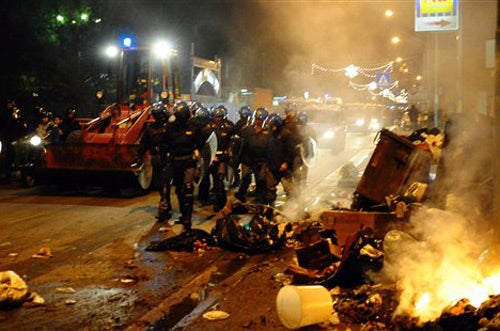Wine and cheese sales fall as waste piles up in Naples

Your support helps us to tell the story
From reproductive rights to climate change to Big Tech, The Independent is on the ground when the story is developing. Whether it's investigating the financials of Elon Musk's pro-Trump PAC or producing our latest documentary, 'The A Word', which shines a light on the American women fighting for reproductive rights, we know how important it is to parse out the facts from the messaging.
At such a critical moment in US history, we need reporters on the ground. Your donation allows us to keep sending journalists to speak to both sides of the story.
The Independent is trusted by Americans across the entire political spectrum. And unlike many other quality news outlets, we choose not to lock Americans out of our reporting and analysis with paywalls. We believe quality journalism should be available to everyone, paid for by those who can afford it.
Your support makes all the difference.Despite sending in the army to shift rubbish and dispatching shiploads of it for disposal in Sardinia, Naples remains clogged with refuse this week, with 7,000 tonnes still piled up on the streets. About 100,000 children continue to miss school, with principals refusing to reopen until the streets are safe enough for children to walk down.
The city's waste has been accumulating since before Christmas, when the last remaining landfills in the Campania region were declared full. And now its farmers are beginning to count the cost in crashing sales. Twenty-nine DOC and other recognised wines and more than 300 traditional artisan foods are produced in the region including buffalo milk mozzarella, the most expensive variety of mozzarella cheese.
But as fears spread of dioxins in the air and contamination of the water system, sales have plummeted. Mozzarella di buffala has been the hardest hit, with a 40 per cent drop in sales, but sales of oil and wine are down 25 per cent, while 35 per cent of fruit and vegetables produced in the region remain unsold, according to the Italian Agricultural Confederation.
Bookings for pensions and agrotourism establishments in the region have also slumped, falling by between 25 and 35 per cent.
The rejection of foods usually considered among the best in the market until a few weeks ago seems irrational, as Campania has long been afflicted by rubbish-related problems. The local mafia is known to have dumped hazardous factory waste in areas of wilderness decades ago.
Join our commenting forum
Join thought-provoking conversations, follow other Independent readers and see their replies
Comments